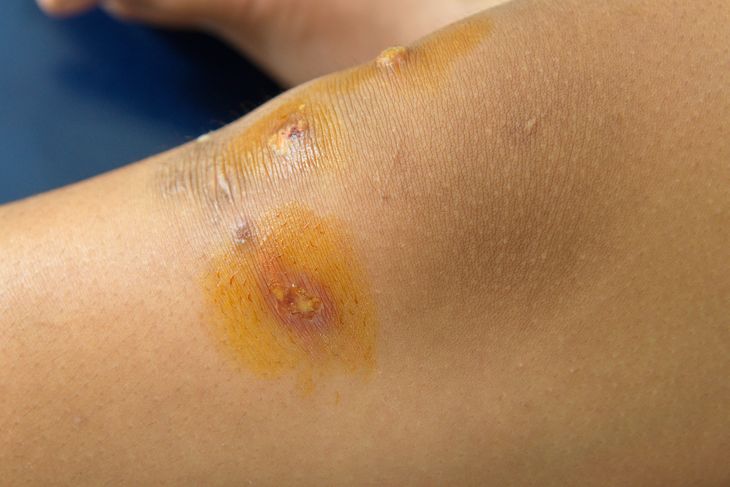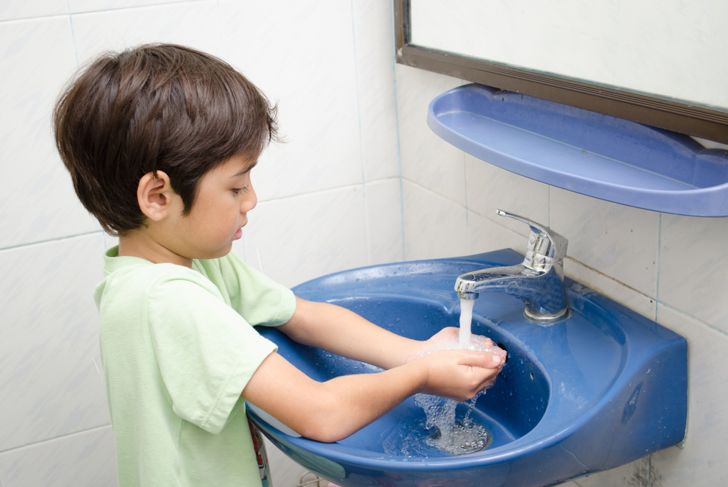Impetigo is a contagious infection that is spread by people of all ages, either through contact with an infected person or by bacteria left behind by the infected person. Most cases of impetigo are treated and resolved quickly, although untreated impetigo can result in complications and may take up to a month to heal on its own. To properly protect yourself and your children from impetigo, it is important to know the answers to these frequently asked questions.
What Is Impetigo?
Impetigo is a bacterial skin infection that is very common. It is also extremely contagious and quickly spreads. Especially among children. Although impetigo often looks like a very frightening and severe condition, it is typically mild and quickly resolved with treatment. Usually, impetigo begins in small cuts or rashes, taking advantage of breaks in the skin. However, it can also infect healthy skin. Infections that occur through other injuries, like cuts and bites, are considered secondary impetigo, while primary impetigo occurs on unbroken skin. Impetigo occurs everywhere around the world and affects people of all socioeconomic statuses.
Causes of Impetigo
Impetigo is caused by one of two types of bacteria: Staphylococcus aureus or Streptococcus pyogenes. Typically, it is spread by touching the infection and then touching another person, or by touching an item that someone else then touches. Doorknobs, light switches, and toys are all common sources of bacteria. People with impetigo can even spread it around their own body by touching an infected area and then touching another place on their body. Because impetigo does not need to enter the skin through an existing cut or break, it is easily spread from person to person.
Risk Factors for Impetigo
One reason that impetigo spreads so quickly amongst children is that they are often in close quarters with each other. Daycares and schools often see the disease spread among students, and families, where one child has impetigo, must go to great lengths to prevent it from spreading to their other children. Typically, impetigo is more common in hot, moist climates, which means it often occurs in summer or areas that stay warm all year. Those who do not have access to proper hygiene, such as antibacterial soap or hot water, are also more likely to contract impetigo. However, because of the way it is spread, it can infect anyone.
Symptoms of Impetigo
The primary symptom of impetigo is an itchy red rash. The rash begins as small sores, which first appear near the mouth. Within a few days, these sores become blisters that are full of pus that may ooze out until the blisters eventually burst and crust over. Some people describe these blisters as painful, although not all impetigo suffers experience painful sores. If left untreated, impetigo can spread to the arms, legs, and other areas of the body. The lymph nodes may swell, and a fever may develop as your body works to fight the infection.
Should You See a Doctor?
If you suspect you have impetigo, you should always see a doctor. When left untreated, impetigo can take a long time to heal and may lead to secondary infections. With proper treatment, it typically is resolved in under two weeks. Another important factor to consider is that failure to properly treat impetigo can result in the infection being spread further. This can result in others getting infected, and it can also result in impetigo being spread to other parts of your body. Treatment for impetigo is typically inexpensive, and it is better to begin while your infection is still mild.
How is Impetigo Diagnosed?
Most physicians can diagnose impetigo by merely looking at your rash. It has a very distinct appearance and is easy to identify without invasive testing. However, if your infection seems more severe than impetigo should be, your doctor may take a sample and do a culture test on the bacteria to determine whether it is a more serious condition. In most cases, however, a brief appointment with your family physician or urgent care center will be enough to get treatment for your infection started.
How is Impetigo Treated?
Impetigo can range from a few small sores to a much more severe infection so treatment may vary. Your physician will suggest a plan that is right for your particular case. In most instances, however, topical antibiotics are the best course of action. Your doctor will prescribe an antibiotic cream that you should use as directed, typically for about a week. Oral antibiotics may also be necessary if the infection is widespread and affects multiple areas of the body. If you are prescribed antibiotics, it is important to take all of them even after the infection disappears, to prevent the return of the infection.
Applying Antibiotic Treatments
Although antibiotics can heal your impetigo, there are several steps you need to take to aid healing and relieve symptoms. At least twice a day, you should clean the affected areas with warm, soapy water. Remove any crusts that have built up on the sores, and dry the area completely. After the area is clean, apply the topical antibiotic to the area. At night, you should cover the area with a gauze bandage to prevent contamination of your bedding. While recovering from impetigo, be sure to wash your hands and any surfaces you come into contact with and limit your contact with other people.
Side Effects of Treatment
If you are given oral antibiotics to treat your impetigo, you may experience some side effects from the medication. The most common side effects are gastrointestinal issues, such as nausea and vomiting, diarrhea, and abdominal pain. This occurs because the use of antibiotics to fight the infection disrupts the balance of the digestive tract bacteria that help you to properly break down and absorb food. Typically, these side effects will resolve themselves with a few weeks, but if they are prolonged or severe, you should talk to your physician. Although more serious side effects can occur, they are very rare.
Preventing Impetigo
Although impetigo is extremely contagious, it is possible to reduce your risk of contracting it. You should always practice good hygiene, including washing your hands with warm water and soap frequently. Taking showers or baths can reduce the number of bacteria on your skin, and washing clothes and linens regularly can also reduce exposure. Disinfecting toys and surfaces that people frequently touch is another good way to stop the spread of infections. Finally, if someone that you or your child interacts with has impetigo, you should not touch them or handle any items they have touched unless the items have been disinfected first.
Can Complications Occur?
As with any infection, impetigo can spread to other parts of the body if left untreated. Typically, these complications are more common in adults. However, they are very rare, with only a small percentage of cases around the globe resulting in serious complications. Some possible secondary conditions include cellulitis, an infection of the tissues beneath the skin, and sepsis, which is a critical condition in which the bloodstream becomes infected. Very rarely, impetigo patients develop an issue known as post-streptococcal glomerulonephritis, which results in blood vessel inflammation within the kidneys. Seeking treatment at the first sign of symptoms can help to reduce the risk of complications.

 Home
Home Health
Health Diet & Nutrition
Diet & Nutrition Living Well
Living Well More
More





















